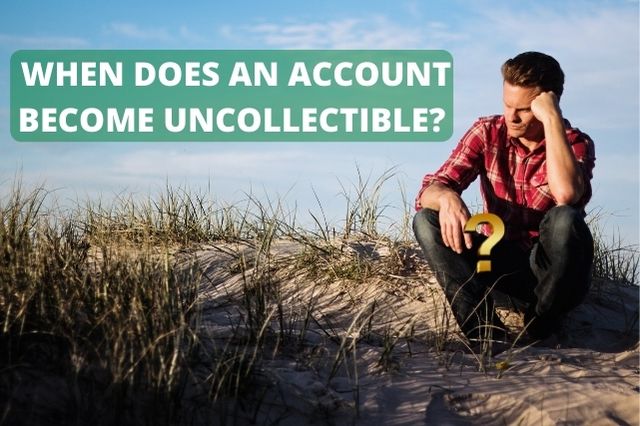
When Does An Account Become Uncollectible?
Account Receivable and Account Uncollectible is such a common thing but most people face problems from time to time, and there are many reasons due to which you may have a case of uncollectible. Uncollectible is an accounting concept that refers to any account for which there is little hope of collection.
Account uncollectible is a really big problem for business owners. For many business owners, accounts uncollectible are the main reason for their business to close in the first place. If you own a business or planning to run a business then you should know about the basics of this Account Uncollectible and also other things.
So, read this article at the end to know When Does An Account Become Uncollectible? And everything about it. But before let’s understand the basic things like What is Account Uncollectible.
What Are Accounts Uncollectible?
Uncollectible accounts on a balance sheet are those that the company has deemed uncollectible. That is, it simply recognizes that the income stream from these accounts will be less than the amount owed.
It’s an accounting rule under FAS 5, which requires companies to write off uncollectible amounts. It’s a challenge to identify bad debts and write them off before they happen. As a result, companies often wait until they can’t collect the debt before writing it off. They do this because it results in more favorable income statement timing for taxes.
The accounts receivable balance sheet account is the total of all uncollected amounts owed to a business. The balance sheet shows all assets that belong to a company at a specific point in time, including cash, inventory, and any other items that are held for use or sale. Accounts receivable refers to the amount owed to a business by customers from credit sales.
Accounts uncollectible are a company’s bad debt expense. Bad debt costs can be very large, which is why some companies tend to ignore or hide this from their shareholders and the public.
Using accounts uncollectible data as a source of information can provide a significant amount of insight into a company’s lending practices and its customers, both good and bad.

When Does An Account Become Uncollectible?
How can you tell if an account will ever be collectible? This is a question that financial managers face every day. Many factors go into the account-recovery equation, but there are a few things to look for the answer the question: Will this account ever is collectible?
If your business sells products or services on credit, you’re going to have some customers who don’t pay. Some won’t pay because they are just irresponsible and never intended to pay. Others will be genuinely unable to pay due to several reasons.
When the creditor is no longer deemed able to pay the debt. The creditor may be capable of paying the debt, but his ability may change over time. For example, a business may take on loans with favorable terms and expect to pay them back easily. But if the business owner gets sick and loses her job, she could stop making payments.
However, if you want to keep your company out of bankruptcy, you need to know when an account becomes uncollectible. With that in mind, here are the situations when you should write off an account:
- The customer has died
- The customer has moved without leaving a forwarding address
- Inability to repay
How To Reduce Uncollectible Accounts?
The goal of every business is to generate revenues and profits. Some of the best ways to achieve this goal are through reducing uncollectible accounts, streamlining operations, and improving customer service. However, these goals may not be easily achieved without creating a structure that serves as a foundation for effective processes and procedures.
Companies have to put systems in place to lessen the amount of time spent on uncollected accounts, which will help them to focus on other more important tasks. Failure to do so may cause you to lose out on opportunities that can bring in more sales and increase your market share.
Check Out:- Broker VS Bank Mortgages: What’s Best For You?
Debt Collection Agencies
Most countries now have laws that protect debtors if they fall into financial difficulty. Under these laws, a lender can only attempt to collect the debt for a certain period before it becomes uncollectible.
However, what lenders do with an uncollectible debt is less clearly defined. For example, it’s not uncommon for debt collectors to sell old debts to other companies who then continue attempting to collect on the debt.
When you think about a debt collection agency, you probably think about those annoyingly persistent calls and texts that follow you day and night. You probably have considered not responding to their messages, but maybe you need the money. If so, you are in the right place.
The recent changes in consumer protection laws have made it possible for debt collectors to lose the right to collect debts after a certain period. Debt collection agencies can no longer use harassing phone calls and text messages to pressure consumers into paying their bills. However, they are still allowed to contact people via mail, email, or in-person conversations.

How Do You Know If A Debt Is Doubtful or bad?
A doubtful debt has been written off by a creditor as uncollectible. Bad debts are those that are expected to never be collected. There can be a difference between the two, because you may collect a bad debt after all, or your debtor may come up with the cash for a doubtful debt when you expect it to go unpaid.
Some debts are doubtful from the start – they were incurred but never paid, or they were contracted fraudulently. Others become doubtful when the borrower or debtor goes bankrupt or into liquidation and fails to pay the money owed.
Conclusion
So, we hope that you all understood fully about Uncollectible accounts and also When Does An Account Become Uncollectible? Accounts receivable is the money that a company is owed that has yet to be paid.
There are two times when an account becomes uncollectible. The first and most obvious time is when the customer declares bankruptcy. But there’s a second, often overlooked time when an account becomes uncollectible: When the company goes out of business.
It’s not uncommon for businesses with underperforming stock to go out of business, and the sudden closure of a business can leave behind a large number of uncollected invoices.
DM us and we’ll make everything easier for you.
